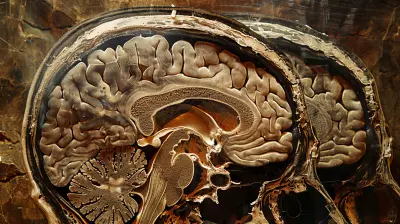Myths and Misconceptions About Living with Schizophrenia
26 August 2025
When you hear the word “schizophrenia,” what’s the first thing that pops into your head? Maybe you imagine someone talking to themselves on a park bench. Or a scary headline about someone doing something dangerous. The truth is, most of what we think we know about schizophrenia is pretty far off the mark.
In fact, the myths and misconceptions floating around this mental health condition are not just wrong—they’re harmful. They spread fear, fuel stigma, and make life even harder for people already navigating a challenging illness.
So, let’s set the record straight. We’re breaking down some of the biggest myths about living with schizophrenia—and replacing them with facts. Because understanding leads to empathy, and we could all use a little more of that.
What Is Schizophrenia, Really?
Before we dive into the myths, let’s get one thing clear: schizophrenia is a serious mental health disorder. It affects how a person thinks, feels, and behaves. Common symptoms include hallucinations (like hearing voices), delusions (false beliefs), disorganized thinking, and sometimes a lack of motivation or emotional expression.But here’s the thing—it’s not just a “split personality,” and it definitely doesn’t mean someone can’t live a meaningful, happy life. With the right treatment and support, many people with schizophrenia do just that.
Myth #1: Schizophrenia Means a “Split Personality”
Let’s start with the big one. Most people confuse schizophrenia with Dissociative Identity Disorder (DID), which involves multiple distinct identities or personalities. That’s not schizophrenia.Reality check: Schizophrenia doesn’t involve having two or more personalities. The term itself comes from Greek roots meaning “split mind,” but that refers to a disruption in thinking and perception—not identity.
So no, people with schizophrenia aren’t “two different people.” They’re individuals who sometimes struggle with reality in a unique way, but they’re still themselves.
Myth #2: People with Schizophrenia Are Violent
This myth is not just wrong—it’s incredibly damaging.Let’s be real: The vast majority of people with schizophrenia are not violent. In fact, they’re much more likely to be victims of violence than perpetrators. Most folks living with this condition are just trying to get by, like everyone else.
The rare instances where violence and schizophrenia intersect are often fueled by untreated symptoms, substance use, or extreme stress—factors that can affect anyone’s behavior, regardless of their mental health status.
Myth #3: Schizophrenia Can’t Be Treated
Another common (and super discouraging) myth is that schizophrenia is a life sentence with no hope. Not true.Here’s the truth: Schizophrenia is treatable. That doesn’t mean there’s a “cure,” but with the right mix of medication, therapy, and support systems, many people manage their symptoms and live fulfilling lives.
Is it easy? No. But living with diabetes or heart disease isn’t easy either, and we don’t write those people off. The same respect and support should go to those with schizophrenia.
Myth #4: People with Schizophrenia Can’t Hold Jobs or Relationships
Okay, so this one has a little more nuance. Yes, schizophrenia can make certain aspects of life harder. Work environments can be stressful, and relationships take patience and understanding.But saying people with schizophrenia can’t do these things? That’s just false.
People living with schizophrenia have jobs, get married, raise kids, fall in love, and go to school. It might take more effort or accommodations, but capabilities vary widely from person to person.
We don’t all fit into neat little boxes—and mental illness definitely doesn’t define someone’s entire existence.
Myth #5: Schizophrenia Is Rare
Nope, not at all. In fact, about 1 in 100 people will experience schizophrenia at some point in their lives. That’s millions of people worldwide.Why does this matter? Because when we think something is rare, we’re less likely to understand it. Schizophrenia isn’t some obscure condition affecting only a few—it’s out there, affecting people you may know without even realizing it.
It’s more common than MS or ALS, and people live with it quietly, often battling stigma on top of their symptoms.
Myth #6: People with Schizophrenia Are Always Psychotic
Psychosis—like hallucinations or delusions—can be a part of schizophrenia, but it’s not constant. People have episodes. They have ups and downs, just like anyone with a chronic condition.Think of it like this: Just because someone with asthma can have trouble breathing doesn’t mean they’re gasping for air 24/7. Same goes for schizophrenia.
Many people go long periods with well-managed symptoms. With effective treatment and support, psychotic episodes can be reduced or even avoided altogether.
Myth #7: Antipsychotics Turn People into Zombies
This one comes from old media portrayals and, yes, some unfortunate history with early medications. But mental health meds have come a long way.Here’s what you should know: Most modern antipsychotics are tailored to reduce symptoms without severely dulling someone’s personality. Of course, side effects do happen—just like with any medication.
But when prescribed correctly and taken under supervision, these meds don’t “erase” who someone is. They help make day-to-day life more manageable, which is a huge win for many people.
Myth #8: Schizophrenia Is a Result of Bad Parenting
Let’s just put this one to rest.Wrong on all counts. Schizophrenia is not caused by overprotective mothers, absent fathers, or “family drama.” The exact cause isn’t fully understood, but it’s likely a mix of genetics, brain chemistry, and environmental factors.
Blaming parents or loved ones is not only cruel—it’s completely unhelpful. Families often serve as lifelines, not causes of the problem. The best thing we can do is support them, not point fingers.
Myth #9: People with Schizophrenia Can’t Make Decisions
This one ties into the misconception that people with schizophrenia aren't “competent” or able to think clearly at all times.But here’s the deal: Having schizophrenia doesn’t mean someone loses all decision-making ability. Sure, during acute episodes, judgment can be impaired—but that’s temporary and manageable.
The rest of the time? Many people can and do make reasoned, informed decisions about their own lives, treatment, relationships, and careers. Let’s not strip them of their agency based on a flawed stereotype.
Myth #10: Schizophrenia Is Always Obvious
You might think you'd “know it if you saw it,” but that's not always the case.Reality check: Not all symptoms of schizophrenia are visible. Some people experience mostly internal symptoms, like hearing voices or intrusive thoughts. Others may appear withdrawn or anxious.
Many people with schizophrenia learn how to function in public or mask symptoms. Just because someone isn’t in the middle of a visible episode doesn’t mean they aren’t struggling—or thriving.
So, What’s the Bottom Line?
Living with schizophrenia is complicated. It’s messy. It’s often misunderstood. But it’s not a hopeless, scary journey through chaos and isolation.It's time to let go of what movies, TV shows, and outdated textbooks have taught us. Real people live with schizophrenia—our coworkers, neighbors, family members, and friends. They deserve compassion, not judgment. They deserve understanding, not fear.
Mental illness isn’t a punchline, a horror story, or a shameful secret. It’s part of the human experience. And the sooner we stop spreading misconceptions, the better life gets for everyone.
What Can You Do?
- Educate yourself: You just did. Great start.- Speak up if you hear someone spreading misinformation.
- Support mental health funding and accessible treatment.
- Show compassion—it costs nothing and means everything.
Remember, knowledge isn’t just power. It’s empathy. And empathy changes lives.
all images in this post were generated using AI tools
Category:
SchizophreniaAuthor:

Alexandra Butler
Discussion
rate this article
1 comments
Kestrel Monroe
“Understanding brings clarity; let’s break stigma and support each other’s journeys!”
August 31, 2025 at 5:05 AM

Alexandra Butler
Thank you for your insightful comment! Together, we can foster understanding and support for those living with schizophrenia.


